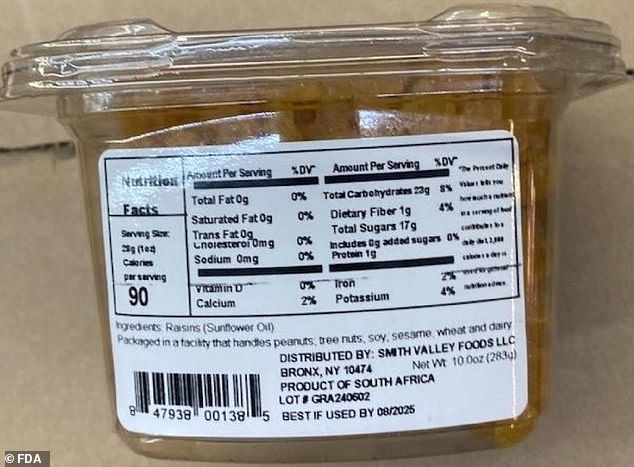Popular raisin brand urgently recalls products due to ‘life-threatening’ allergy risk
Packages of raisins sold in New York have been recalled because they can cause a “life-threatening” reaction.
Testing by health officials found that Terrafina Golden Raisins, sold in stores across the state, contained undeclared sulfites.
The preservative could cause an allergic reaction in up to 500,000 Americans, primarily asthmatics.
In milder cases, patients experience red and itchy skin, a rash and hives. But in more severe cases, people can develop anaphylaxis, a severe and potentially fatal reaction in which people begin to wheeze and have difficulty breathing.
The golden raisins in 10oz packages were sold in stores throughout New York State

According to experts, they have a best-before date of May or August 2025. They should be returned to the seller for a full refund.
New York State Department of Agriculture and Markets food inspectors discovered the sulfites during routine testing of the products.
They have recalled the 10 oz square clear plastic containers that contain 10 oz raisins. These containers were made by Sunco and Frenchie, based in New Jersey.
The raisins have a best-before date of May or August 2025.
Consumers are urged not to consume the products and to return them to the retailer, where they will receive a full refund.
Other box sizes, such as 12oz raisins and 16oz raisins, are not expected to be affected.
Sulfites are found in hundreds of household items, including red wine, ketchup, frozen fries and cereals. They are used to combat mold and keep produce fresh.
Food agencies say these are safe to consume, but must be listed on the label when they are present at levels of 10 parts per million (ppm) or more — above the threshold at which they can cause an allergic reaction.
According to experts at the University of Florida, their levels in food do not normally exceed a few hundred ppm. But in certain fruits and vegetables, they can approach 1,000 ppm.
Some people suffer from a milder form of sulfite allergy, a so-called sulfite hypersensitivity. This allergy causes symptoms such as a blocked or runny nose, a tight feeling in the chest, coughing and sneezing.
There is also evidence that the additives damage cells, but the International Agency for Research on Cancer says there is “insufficient evidence” to link them to cancer.
According to experts, an allergy to additives is normally only diagnosed once other possibilities have been ruled out.
Allergy expert Dr Jordan Scott previously said: ‘The hardest thing about diagnosing a sulfite allergy is that there is no test we can use.
“It’s more of a diagnosis based on exposure history, often ruling out other food allergies.”
